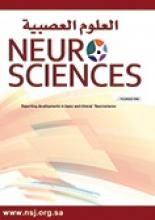Abstract
OBJECTIVE: To evaluate the outcomes of early comprehensive rehabilitation protocols for traumatic brain injury (TBI) using the functional independence measure (FIM), and to study the relationship betweenFIM and Glasgow coma scale (GCS) variables to determine which patients will be best served by rehabilitation therapies.
METHODS: Fifty-one subjects with diagnosed TBI receiving treatment at a single inpatient rehabilitation facility at Jordan University of Science and Technology, Teaching Hospital, Irbid, Jordan were enrolled in this experimental study between August 2006 and February 2008. Of the enrolled subjects, 47 completed the study. The mean age of the participants was 33 years (8 females and 39 males). Glasgow coma scale was measured on admission. Functional independence measure score was measured on admission and on discharge. According to the GCS, the participants were divided into 3 groups as severe injury (GCS: 3-8 [n=24]), moderate injury (GCS: 9-12 [n=12]), and mild or no injury (GCS: 13-15 [n=11]). The FIM score and CGS and their relation were evaluated.
RESULTS: Evaluation outcomes revealed a significant improvement in FIM scores after rehabilitation compared to the FIM admission (p=0.00006) in severeTBI. In moderate TBI, the FIM scores were significantly improved (p=0.0004) after rehabilitation. However, with minimal injury, the FIM scores were not significantly improved (p=0.15).
CONCLUSION: Early rehabilitation interventions significantly improved the FIM scores in moderate and severe TBI patients. ERRATUM NOTICE PUBLISHED IN NEUROSCIENCES 2009; 14: 306.
- Copyright: © Neurosciences
Neurosciences is an Open Access journal and articles published are distributed under the terms of the Creative Commons Attribution-NonCommercial License (CC BY-NC). Readers may copy, distribute, and display the work for non-commercial purposes with the proper citation of the original work.






